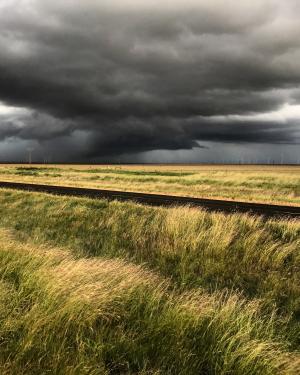Creating a Disaster Plan For Your Business

If there’s anything we can count on living in Oklahoma, it’s unpredictable weather. With warm weather finally in full swing, we’ve already had a handful of wild weather fronts come sweeping down the plains this season. Three Oklahomans have tragically lost their lives already this year amid a rash of deadly tornadoes, and it’s only the beginning of tornado season.
It can be incredibly daunting to get your life and business back on track after a storm. But having access to the important information you need to keep things moving forward is essential to the storm recovery process. Whether you’re a business owner or a remote work employee, here’s what you need to know.
Keeping Essential Documents Safe
We can’t emphasize enough the importance of being able to access crucial information after a disaster. On the personal side of things, when you’re struggling with the physical and emotional impact of a disaster, the last thing you need is to have no proof of identification or insurance information to help you start getting your life back on track. As a business owner or remote employee, the ability to access important documents can help ensure continuity and protect your clients or company from a data breach.
Make a list of every record you need to back up or keep track of in the event that you’re forced to evacuate your home. Here’s a FEMA-recommended list of the most important documents to back up or gather in such an emergency:
Personal Records
Birth certificates
Marriage licenses
Adoption certificates
Death certificates
Passports
Driver’s licenses
ID cards
Social security cards
Work keycards
Personal contact list
Business contact list
Medical Records
Prescription information
Health provider contact information
Health insurance cards
Financial Records and Information
Pay stubs
Bank statements
Retirement statements
Safe deposit box keys
Debit and credit card information
Property Records
Deeds
Leases
Mortgage information
Insurance information
Automotive titles
Keepsakes
Family photos
Keepsakes
If you work remotely, you should also include a copy of your employer’s protocols in case of an emergency.
Creating an Emergency Contact List
Be sure to include everyone you might potentially need to connect with during or after an emergency on your contact list. We tend to rely on our phones to “remember” numbers for us these days. During an emergency, you may become separated from your phone or even be unable to power it on. It’s even possible that you might not have service depending on the type of emergency.
Don’t forget to include these numbers on your contact list:
- Property management or leasing company
- Insurance providers’ contact information
- Your attorney’s contact information
- Preferred contractors and services including plumber, general contractor, electrician, towing, and tree removal service
Backing Up Your Documents
Don’t make the mistake of thinking it’s enough to keep your important documents in a safe location inside your home. In today’s world, there’s no reason why every important photo or document can’t be digitally backed up.
Follow these steps to ensure your documents will be safe in case of an emergency:
- Scan all of your important documents.
- Upload them to a secure cloud-based system.
- Make sure everything is password-protected.
- Be sure to check your backup system regularly.
- Understand and follow any relevant remote work protocols.
- Store your originals off-site in a safe deposit box or someplace safe.
- Keep a flash drive with digital versions stored in your home emergency kit.
Managing Communications
When things are chaotic in the wake of a disaster, maintaining good communication can go to ensure your clients and business partners that your operation isn’t going anywhere and their data, investment, or money is safe.
While creating your business disaster plan, be sure to plan ahead for the following:
- Update your website and social media pages to let clients know where to contact you and what’s going on.
- Update your voicemail messages.
- Consider sending out a general text message.
- Contact clients directly via text message, phone call, or email.
- Confirm all appointments and reassure clients.
- Manage expectations to let everyone know what to expect if you anticipate any delays.
Follow Cybersecurity Best Practices
If a disaster finds you unexpectedly working remotely, it’s important to understand and follow these safe cybersecurity practices:
- Never use public wifi for business communications.
- Turn on “Find My Device” so your device can be easily located if you become separated from it.
- Encrypt all emails and sensitive data.
- If you work for someone else, report any potential security issues right away.
Call Gilpin Law Office if You Need an Attorney
Recovering from a disaster is always challenging. But having the right people on your team can make all the difference. Tim Gilpin helps Oklahomans with bad faith insurance claims, wrongful termination, and more. To get your free consultation, give Gilpin Law Office a call today.
